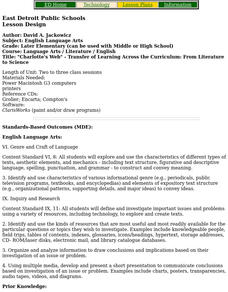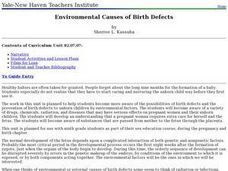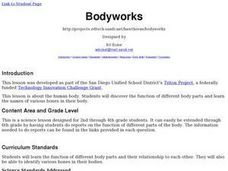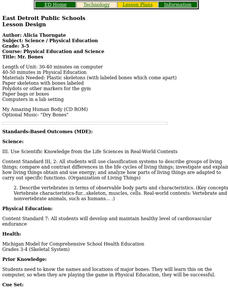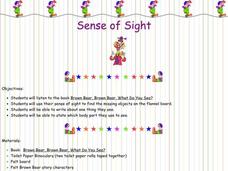Curated OER
Unlocking the Endocrine System
Fifth graders use an analogy to the mail delivery system to study the workings of the human endocrine system. They discover the interrelationships between the human body systems while comparing them to engineering communicating with...
Curated OER
The Body of Human Rights
Learners, in groups, draw a life-size outline of a person on paper. They then place each article of the Universal Declaration of Human Rights on a part of the body, writing the number of the article in the appropriate place (e.g.,...
Curated OER
"Charlotte's Web" - Transfer of Learning Across the Curriculum: From Literature to Science
Students research and write about the parts of a spider's body using educational software. They draw spiders using computer software.
Curated OER
Human Rights Education Handbook: Image Theater
Students create a human machine to represent a concept related to human rights such as opression, liberation, justice. They make one machine per group, adding one person with a repeating sound and motion at a time.
Messenger Education
Exploring Exploring
The reason people first began trading was because of their desires for objects other societies possessed. In the activity, classes discuss why exploration has been a common thread in all societies and where these desires have taken...
University of Minnesota
Connect the Neurons!
Create a neuron frenzy as your pupils play the part of the neurons. An engaging lesson plan creates a human chain of neurons that pass cotton balls posing as neurotransmitters. Scholars learn about pre- and post-synapses as they...
Curated OER
Environmental Causes of Birth Defects
Get your high schoolers thinking about the factors that lead to birth defects. They examine how environmental factors and personal choices can cause birth defects in unborn children. They discover the effects of various handicaps such as...
Curated OER
Bodyworks
Students study about the different parts of their body and the names of bones as well. They gain an understanding of the function about the parts. Students follow along as the teacher guides them and points out various parts and their...
Curated OER
The Human Body: Focusing on Respiratory and Circulatory Systems
Students study the components and functions of the respiratory and circulatory systems. They take blood pressure using a stethoscope and investigate ways to maintain a healthy respiratory system.
Curated OER
Human Skeletal System
Learners trace the outline of one of their members and draw in the bones from the diagram. They make flashcards of the bones out of index cards. Once the drawings and flashcards are finished, they quiz each other in preparation for a game.
Curated OER
What's Your Angle?
Third graders read the story, Magic Schoolbus Inside the Human Body. Then they form right, acute, and obtuse angles using the joints inside their bodies. They write a brief summary about what they learned about angles as a review the...
Curated OER
Talk to the Hand
Students explore the significance of various body parts in artistic and social expression. They research a body part and create a museum installation depicting the artistic and social significance of the body part throughout history.
Curated OER
Bones, Bones, and More Bones
Young scholars describe the functions of bones in the human body. They describe the make up of a bone. They engage in a series of wonderful hands-on activitiies that reinforce learning of bones and the skeletal system.
Curated OER
Mr. Bones
Students play CD-ROM game My Amazing Human Body, and participate in relay game in Phys. Ed. where they put together skeleton on which body parts are labeled.
Curated OER
Hawaii's Sea Turtle Exploration
Students investigate the life cycle and body parts of Hawaii's sea turtles. In this sea turtle lesson, students watch a video about the turtle life cycle and make a model of a "Honu," sea turtle. They complete an associated worksheet.
Curated OER
As Good As Gold
Students find examples of the Golden Ratio on the human body through measurement. Additionally, students learn about the use of the Golden Ratio and the Golden Rectangle in art and architecture. A very interesting lesson for the students!
Curated OER
The Insect World
Students investigate how insects communicate since they cannot use their mouths for producing sound like humans can. In small groups, they devise a way to make an insect-like sound using body parts other than their mouths or vocal...
Curated OER
Medical Instrumentation
Students analyze how medical devices that help the human body function. They work in pairs or groups to draw multiple views of the medical device and describe how engineering is used by biomedial engineers.
Curated OER
Fish Fashion 101
Students explore fish anatomy. In this fish anatomy and adaptation lesson plan, students define and identify the location of fish body parts. Students add these parts of a fish's anatomy to a life-sized fish costume worn by a...
Curated OER
Gravity: It's GREEEAAATTT!
Students calculate effects of gravitational force on planets, discuss the effects of weightlessness on the human body and describe and demonstrate how objects in a state of free fall are accelerated by gravity at an equal rate.
Curated OER
Sense of Hearing
Students explore the sense of hearing. In this human biology lesson, students listen to the story Polar Bear, Polar Bear, What Do You Hear? and give examples of how they use their sense of hearing everyday. Students pass around plastic...
Curated OER
Review of the Five Senses
Students investigate the five senses. In this human biology activity, students are given five items and identify which items match best with each of the senses. Students use objects such as a rock, hard candy, and a flower.
Curated OER
Seeing the Seafloor Using Sound - Multibeam Sidescan Sonar
Students are told that sound is not just stuff that our ears hear. They are explained that it is a tool for measuring and looking at objects in a new way. Students are introduced to sound waves and sonar imaging. They are explained...
Curated OER
Sense of Sight
Students examine the sense of sight. In this human biology lesson, students read the book Brown Bear, Brown Bear, What Do You See? and discuss all of the animals seen in the story. Students use binoculars and take several digital photos...


